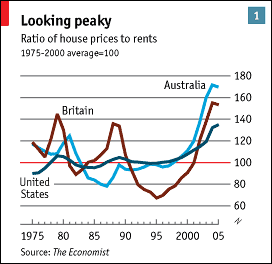This post comes belatedly, but I just came across a June 16 Economist article that anyone contemplating buying their first home should read.
This [housing] boom is unprecedented in terms of both the number of countries involved and the record size of house-price gains. Measured by the increase in asset values over the past five years, the global housing boom is the biggest financial bubble in history. [emphasis added]
However, as the article warns, "The bigger the boom, the bigger the eventual bust." That bust may already be started, considering that house prices in Australia and Britain have already peaked. Their central banks have been a bit tighter with the money supply than the US Federal Reserve, with the predictable result that the American housing bubble continues to expand.
A number of pundits, myself included, have been warning for some time that the bubble will burst, but it hasn't happened yet. Similarly in the late 1990s, a handful of cassandras warned that the dot com bubble was doomed to burst. That it didn't, year after year, only emboldened more people to sink more money into the game before it finally burst.
A defining characteristic of the dot com bubble was that investors didn't actually expect the companies to make money. They just expected the share price to go up as more people jumped on board in anticipation that Nortel, Lucent or Cisco would snap it up. The trick, therefore, was to grok the zeitgeist and get in early.
I knew things were about to get ugly when I heard the harried CEO of a dot com complain on a radio interview that her company was short of cash and needed more investors. Investors? I thought; What that company needs is some revenue. But that wasn't how the dot coms worked, which is to say they didn't work in the long run.
The Economist article reads:
there is a troubling similarity between the house-price boom and the dotcom bubble: investors have been buying houses even though rents will not cover their interest payments, purely in the expectation of large capital gains—just as investors bought shares in profitless firms in the late 1990s, simply because prices were rising.
That is, people have bought investment houses at a guaranteed loss, betting that the house itself will appreciate enough to make up for the monthly shortfall in rent income.
In typical mania fashion, everyone expects that houses will simply go on appreciating forever. Indeed, banks have begun offering no-money-down mortgages - even negative amortization mortgages, in which the payments for the first year aren't enough to cover interest on the principal. This can only work if the house value keeps going up.
That won't be possible for much longer. The growth rate has been exponential, and it's simply not possible to sustain exponential growth rates forever. Throughout history, every boom eventually busts.

Source: The Economist
In at least one important way, the housing bubble is much worse than the dot com bubble: generally, people didn't go into debt to buy dot com shares. Much of the US economy is not based on debt, from mortgages to buy houses to consumer purchases made from equity siphoned out of appreciating house values.
When the economy depends on people using their houses as personal ATMs, more than simply stock prices will be at stake when the housing bubble pops. As a result, a major worldwide recession is a distinct possibility.
James Howard Kunstler has been warning for years that the US economy is based significantly around the housing industry, and the Economist agrees:
Two-fifths of all American jobs created since 2001 have been in housing-related sectors such as construction, real-estate lending and broking.
Add in jobs created in retail industries that provide furniture, appliances, and other house-filling items, and the housing-related share is even higher.
So not only is a significant share of consumer spending dependent on home equity; a significant share is also dependent on building more houses and filling them with stuff. When the bubble bursts, both of these sources of consumer spending are going to evaporate.
Perhaps the Fed still has a trick or two up its sleeve, but it doesn't look good. Interest rates can't get much lower, and in any case sustained high fuel prices are triggering inflation, which pushes rates up. The government cannot cut taxes any more to spur growth, because it's already running a $400 billion deficit.
The article ends on a sobering note:
The whole world economy is at risk. The IMF has warned that, just as the upswing in house prices has been a global phenomenon, so any downturn is likely to be synchronised, and thus the effects of it will be shared widely. The housing boom was fun while it lasted, but the biggest increase in wealth in history was largely an illusion.
You must be logged in to comment.
There are no upcoming events right now.
Why not post one?